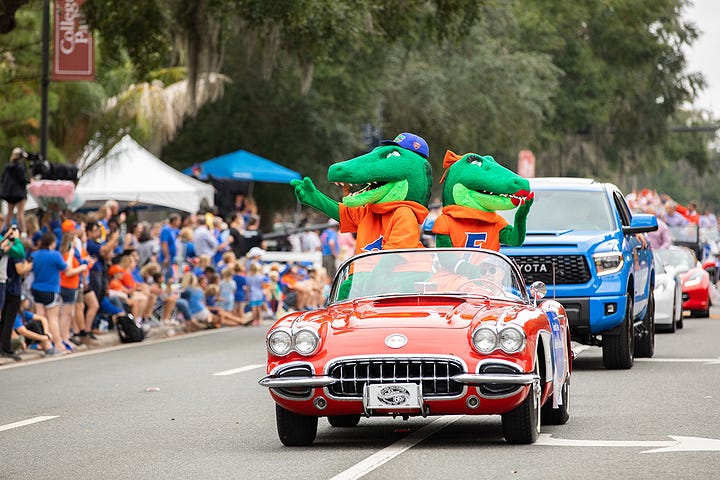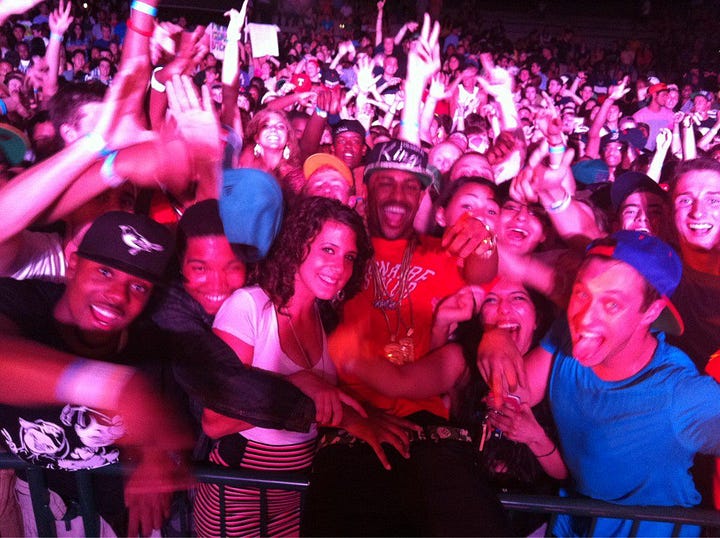The Civic Homecoming
Encouraging "alumni" of a place to return to the town they once called home, reconnect with old friends, and renew a spirit of participation and contribution.


Tis’ the season of homecomings in college towns across the United States. Throughout the fall, swarms of alumni have been descending upon towns large and small to reconnect with old friends, old places, and old drinking habits. Cue (old) Kanye.
Despite their pomp, their circumstance, and their excess, homecomings serve a purpose. By reconnecting alumni with the people they once cared for and the places they once called home, colleges hope to spur a renewed spirit of participation among their alumni. And it works. For the alumni teams at many colleges, homecoming is an anchor program precisely because it generates more alumni service (e.g., mentoring, volunteering) and more alumni giving.
Recently, I’ve been thinking a lot about how towns can be more intentional about treating their past residents as “alumni” to be engaged. Much like colleges, towns have alumni who have passed through their institutions, cultivated local relationships, and maintained some affinity to the place. But unlike colleges, most towns don’t view these alumni as a stakeholder group to be stewarded. Towns and regions invest time and resources into making their community an attractive place to live, but once people have left, their approach is often one of: “out of sight, out of mind.”
This is a missed opportunity. Towns can and should create an alumni experience for their past residents, and they should start by hosting an annual civic homecoming.
Much like college homecomings, this weekend-long series of fun activities would encourage people who have left to return to the place they once called home and reconnect with their old friends and neighbors. But while the civic homecoming may be designed to create a fun experience for alumni, that’s only part of the equation. By forging a renewed connectedness to people and place, the civic homecoming could likewise renew a spirit of participation among alumni — leading to more local service, more local investment and donations, and, potentially, more alumni moving back home.
The formula for the civic homecoming is simple: start with fun and nostalgic activities as the hook to get alumni to show up, recognizing that a deeper connection to the place will form organically throughout the experience. The civic homecoming could kick off with a Friday night football game — often, one of the last remaining events that bring a large cross-section of a town together — and include several different activities throughout the weekend. This could involve a festival during the day on Saturday, with events ranging from a homecoming parade, to sports tournaments and arts workshops, to panels or talks featuring locals and alumni, to community service projects. The weekend could conclude with an all-community concert or dance party that brings people together in a shared celebration of the place.
These are just a few initial ideas. Ultimately, the homecoming programming should reflect the culture, traditions, and values of the place, while avoiding coming across as over-engineered.
When it comes to execution, the entire civic ecosystem would need to be engaged as partners for a homecoming weekend — and that’s a good thing. Because these homecomings may be tied to local high schools (e.g., football games, existing homecoming weekends), school leadership — and, potentially, students — could be intimately engaged in the planning of homecoming weekend. Beyond schools, local businesses, nonprofits, and other community groups could serve as partners for the various events and activities that could go into making homecoming a success. Funding for the entire weekend could come via sponsorships: from local businesses, community foundations, and individual benefactors, along with the local Chamber of Commerce and tourism board. Tickets to select events (e.g., the football game or concert) and merch sales could provide additional revenue streams. I’m getting excited just imagining the weird T-shirts that could be created.
To facilitate the year-round organizing and coordination to make homecoming a success, towns could establish a “Homecoming Committee” (perhaps the most fun committee in town). The “Homecoming Committee” should include many of the local leaders and students described above who could drive the on-the-ground activation around homecoming. But the committee shouldn’t just be for locals; alumni should be involved, too. These alumni could help design an experience that fellow alumni would actually want to attend and could help promote homecoming through their networks. This will be critical, as the success of civic homecoming will hinge upon effectively identifying and convincing alumni to participate. While the potential complexity of this organizing effort may cause challenges, it could also be its strength. The “Homecoming Committee” could offer a galvanizing opportunity to build trust and rapport among groups that don’t typically interact — both within the town and between town and alumni stakeholders.


But should towns really put in all of this effort to encourage their alumni to come back home? I’d argue that it’s certainly worth a try, as civic homecomings have the potential to produce significant, tangible benefits for towns and their alumni alike.
These homecomings are essentially new, annual festivals that can immediately energize a community’s civic life through their wide range of events and activities. Community groups, particularly in places where civic life has declined, have an opportunity to re-engage both longtime residents and alumni who are returning home. Much like a town activities fair, this can spur local participation long after civic homecoming weekend concludes. Local small businesses can also benefit. The increased visitation and spending that the weekend generates can become a substantial new revenue source — and one that can grow alongside the growth of the civic homecoming weekend.
Still, the bigger effects of civic homecomings may emerge from engendering a sense of connection among alumni and allowing the ripple effects to emanate from there. A successful civic homecoming weekend will renew alumni’s connections to old friends and old stomping grounds, and, in so doing, potentially renew their connection to the place they once called home. This deepened connection may inspire alumni to give back — whether by getting further involved in town alumni activities, donating to local groups or directly to the town, investing in local small businesses and real estate, or even moving back and fully recommitting to the place.
This is the magic of a civic homecoming: by connecting current residents to alumni relationships and resources outside of their community, they can then bring these relationships and resources to bear within their community. All of this can be especially helpful for places that have experienced net-out migration, as it flips outward mobility on its head, tapping into those who have departed to give back to the place they have left.
Perhaps you’re reading this and thinking, “This is a lot of hype for just one weekend.” And that’s true. Civic homecoming weekends won’t be the be-all and end-all for alumni engagement. Some alumni may prefer a lower-key entry point for involvement. Even for the alumni who do attend civic homecoming, most will need additional outlets to remain engaged — alumni clubs to join, alumni activities to participate in, and alumni boards and councils to lead.
They’ll want to go deeper after homecoming — and that’s the point.
Towns that want to re-engage their alumni will need to start somewhere. The activation energy created from a civic homecoming — the fun and joy of the experience, the sense of connection it engenders, the pomp and circumstance of it all — makes it the perfect place to jump in.
Start with fun and build from there.






Love this. I've been thinking of the inverse (especially since the 2016 elections). How can we cultivate a sense of civic care about the places we come from even as we move away? Can we activate and connect domestic "micro diasporas" around things like voting, giving, etc? This goes beyond the occasional gatherings in cities (e.g. informal camaraderie and pride of a home team sport bar) to something more activated and rich.
As more and more people live away from their hometown—and live mobile lives— we don't have mechanisms for multiple sites of belonging. Or civic care. My relationship with Detroit/Michigan is much more than a visitor— what mechanisms might hold that sense of stewardship and place better?
(This would be a fun inverse to write if you need a guest!)
This is a great idea. I've been a huge fan of how Detroit has been doing this for 11 years. https://www.detroithomecoming.com/ Definitely want to model it for our community.